Wondering why your child struggles with focus, mood, or emotional outbursts? Could a gene be amplifying ADHD, anxiety, and dysregulation, increasing stress sensitivity? Dr. Roseann Capanna-Hodge, creator of Regulation First Parenting™, shows parents how to decode behavior and calm the brain effectively.
If you’ve tried everything and your child still melts down, struggles to focus, or seems stuck in fight-or-flight, you’re not failing. You’re not alone.
In this episode, I dive into how a gene could be amplifying ADHD, anxiety, and dysregulation and, most importantly, what you can do to calm the brain and create real change.
Why does my child seem more reactive than other kids, even with good parenting?
When a child’s nervous system is already under pressure, genetic factors can lower their stress tolerance. Genes like MTHFR don’t cause attention deficit hyperactivity disorder (ADHD), anxiety disorders, or emotional dysregulation—but they can amplify vulnerability when combined with chronic stress, genetic and environmental influences, and other risk factors.
This matters because research shows ADHD and related psychiatric disorders have a complex genetic architecture involving multiple genes, gene–environment interactions, and socioeconomic factors.
Key takeaways:
Genes involved can affect detoxification, inflammation, and neurotransmitters like dopamine and serotonin
Stress exposure fills the “stress cup” faster
Behavior is communication—not a character flaw
Real-Life Example: Two kids have the same school day. One recovers quickly. The other melts down for hours. Same environment—different genetic susceptibility, highlighting how genetic and environmental influences shape responses to everyday stress.
Could MTHFR really impact ADHD symptoms, anxiety, or emotional regulation?
Yes—but not in the scary way social media makes it sound. MTHFR is one of many genetic variations affecting methylation, the process that helps the body clear stress hormones and inflammatory byproducts. When methylation is sluggish, the sympathetic nervous system stays activated longer, making recovery from stress more difficult.
Findings suggest kids with ADHD symptom dimensions, obsessive compulsive disorder, anxiety disorders, or major depressive disorder may struggle more with recovery after stress—especially when genetic and socioeconomic interplay, genetic and environmental influences, and other environmental risk factors pile up.
What parents often notice:
Heightened anxiety & emotional volatility
Slower recovery after meltdowns
Sensitivity to medications or supplements
This doesn’t change the ADHD diagnosis—but it helps explain why regulation takes more effort in some children, even with supportive parenting and structured routines.
If you’re tired of walking on eggshells or feeling like nothing works…
Get the FREE Regulation Rescue Kit and finally learn what to say and do in the heat of the moment.
Become a Dysregulation Insider VIP at www.drroseann.com/newsletter and take the first step to a calmer home.
Is ADHD genetic, environmental, or both?
It’s both. Genome-wide association studies show a strong genetic link for deficit hyperactivity disorder (ADHD), including rare genetic variants, associated genes, and gene expression tied to brain structure and cognitive functions. Statistical significance, functional annotation analysis, and future research continue to clarify genetic risk.
But genes are just risk factors—parenting, stress, sleep, and environmental exposures shape how they actually express.
Bottom line:
ADHD is highly hereditary, but not destiny
Environment can buffer or worsen symptoms
Let’s calm the brain first—always
🗣️ “Genes may increase sensitivity, but regulation decides how the brain responds.”— Dr. Roseann
What should parents actually do if genetics are part of the puzzle?
First—breathe. This isn’t about extreme protocols or supplement stacking. Further research shows that while certain genes have significant association with stress sensitivity and ADHD traits, regulation and nervous system support remain the most important steps.
Here are Regulation-First steps:
Calm the nervous system first—no supplement fixes survival mode
Go low and slow with any genetic support
Reduce the stress load: predictable routines, better sleep, fewer power struggles
Think systems, not magic wands—sleep, nutrition, emotional regulation still matter most
If your child’s stress cup is overflowing, Quick CALM can help gently downshift the nervous system and support recovery without overstimulation. It’s a simple, regulation-first tool parents love.
Takeaway & What’s Next
When progress stalls despite good support, deeper genetic insights can bring clarity—not labels. Understanding genetic predispositions helps parents stop blaming behavior and start changing outcomes.
It’s not bad parenting—it’s a dysregulated brain. And it’s gonna be OK.
Discover practical strategies to calm your child’s brain and reduce meltdowns at the Regulated Child Summit. Join now for actionable tools that make regulation simple and doable.
FAQs
Can a gene cause ADHD?
No. ADHD involves multiple genes and environmental factors working together.
Should I test my child for MTHFR?
Testing can provide insight, but regulation and environment still matter most.
Does MTHFR affect medications?
Yes. Poor methylation may increase sensitivity to psychiatric medications.
Can adults have these genetic issues too?
Absolutely. Adult ADHD and anxiety can also be influenced by genetics.
Feel like you’ve tried everything and still don’t have answers?
The Solution Matcher helps you find the best starting point based on your child’s symptoms, behaviors, and history.
It’s fast, free, and based on decades of clinical expertise.
Get your personalized plan now at www.drroseann.com/help



